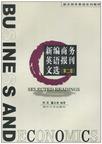新编商务英语报刊文选
2010-9
南开大学出版社
师英,董志善 编著
372
338000
本书面向普通高校本科学生,是一本商务、经贸和经贸英语专业的阅读类教科书,文章全部选自英语国家近年出版的著名报刊和杂志,涉及许多商务和经贸的重要领域,文章难度和长度适中,比较适合教学使用。
本教材涵盖四大部分:第一部分为全球和国家经济形势;第二部分为世界贸易;第三部分为金融;第四部分为管理。全书共分为十八个单元。每个单元均选取两篇课文,可由教师选择一篇在课上讲解,另外一篇可作为学生的课外阅读作业。为了帮助学生更好地理解课文,我们在课文的后面附有生词和短语表、专业术语表及注释。此外,还设计了各种练习。
Part One Global and National Economic Situation
Unit One
Text A Another Bush; Another Jobless Recovery
Text B TheHard Road Ahead
Unit Two
Text A Finally, Some Good News
Texr B Steaming
Unit Three
Text A Too Much Money: Inflation Goes Global
Text B The New "New Economy"
Unit Four
Text A India's Economy Hits the Wall
Text B A Yawning Trade Gap Could Swallow the Recovery
Unit Five
Text A Can Europe's Recovery Last?
Text B Climb on, Honey: This Could Be Wild
Part Two World Trade
Unit One
Text A The Doha Squabble
Text B Drops on Parched Soil
Unit Two
Text A China and Europe
Text B The Folly of Slapping Quotas on China
Unit Three
Text A 2005's Global Trade Hot Spots
Text B Sparks Fly over Steel
Unit Four
Text A Slouching toward a Trade War?
Text B The GM Gamble
Unit Five
TextA Two Chee for Free Trade
Text B Engaging the U.S. with Trade
Part Three Finance
Unit One
Text A Time to Go Up
Text B The Joy of Inflation
Unit Two
Text A Looking Up
Text B Still in Gear
Unit Tree
Text A Searching for Plan B
Text B Drowning in Dolla
Unit Four
Text A Ocea Apart
Text B Super-euro
Part Four Management
Unit One
Text A Make Way for Madame Director
Text B Earnings Guidance: Silence Is Golden
Unit Two
Text A Finally, Coke Gets it Right
Text B The Live Wire in Indian High Tech
Unit Three
Text A Microsoft without Gates
Text B Gates without Microsoft
Unit Four
Text A Audi Volvo, Acura ... Chrysler?
Text B Volkswagen Needs a Jump
For one thing, the government is already trying to cool down theboom. Admittedly, it is not going about this in the most direct way, byrevaluing the yuan. The fixed exchange rate and strong capital inflowshave caused foreign-exchange reserves and hence the money supply toswell. The broad money supply grew by 21% in the year to October. Thecentral bank has tried to soak up the excess liquidity by selling bonds, butthis "sterilization" has its limits. More helpfully, the central banktightened regulations on lending to property developers in June andincreased banks reserve-requirement ratio in September. The rate ofcredit growth is already falling. This should cause the economy to slownext year, but not to collapse. A second reason not to panic yet is that there are few of the signs ofoverheating usual at a cyclical peak. Chinas current-account surplussuggests that domestic demand is not overstretched; inflation, although ata six-year high, is only 1.8%; and though property prices are bubbling insome cities, average house prices have risen by only 4% in the past year. China does not look like the East Asian tigers before their crisis.Unlike China, they all had huge current-account deficits and big externaldebts, as well as higher inflation rates and surging property and shareprices. Chinas is the only stock market among the 40 that The Economisttracks each week to have fallen this year. "Overheating" usually implies excess demand which triggers higherinflation or soaring asset prices. Yet the enormous increase in industrialcapacity suggests that deflation may still be a bigger risk. Some industries, such as electricity and steel, are short of capacity.
